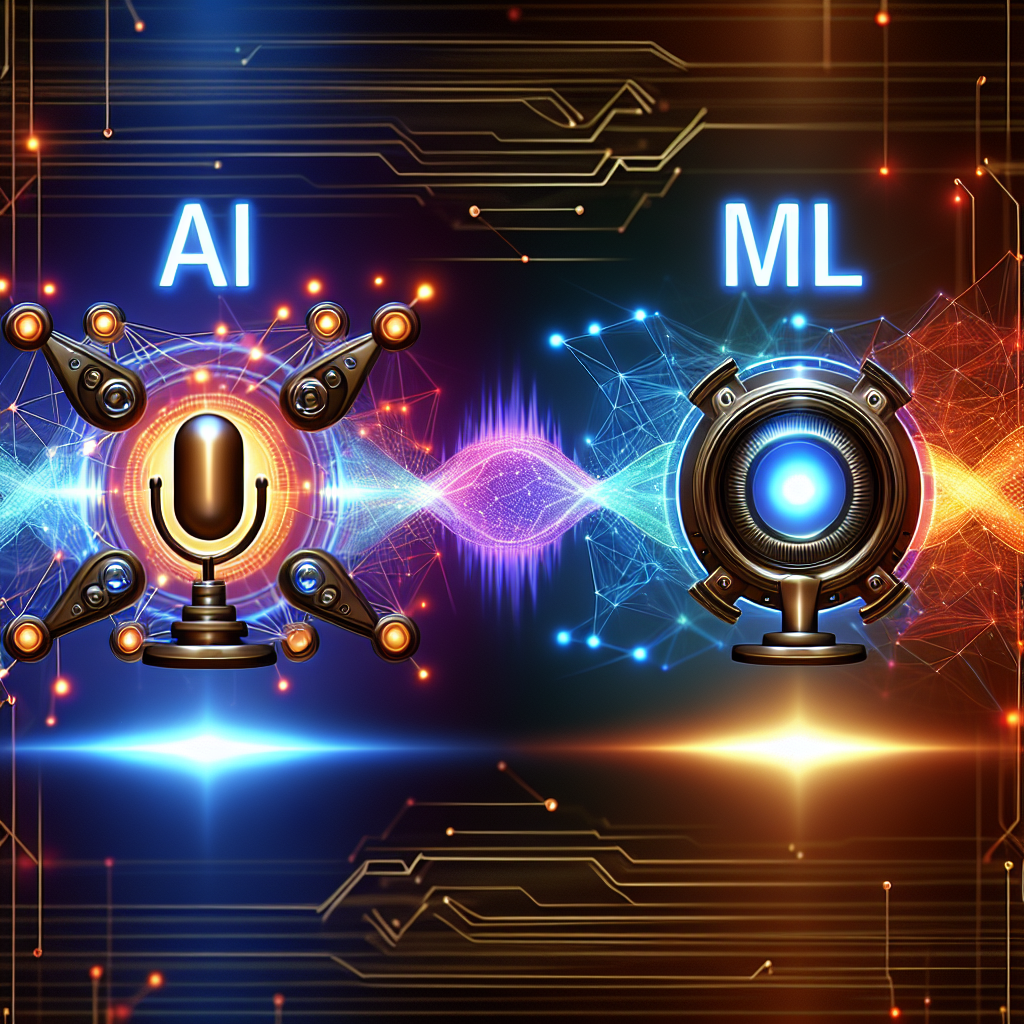AI vs ML: Which Technology is More Effective at Speech Recognition?
In recent years, artificial intelligence (AI) and machine learning (ML) have become increasingly popular technologies for a wide range of applications, including speech recognition. Both AI and ML have the ability to process large amounts of data and learn from it to improve their performance over time. However, there is often confusion about the differences between the two technologies and which one is more effective at speech recognition. In this article, we will explore the differences between AI and ML, their respective strengths and weaknesses, and ultimately determine which technology is more effective at speech recognition.
AI vs ML: What’s the Difference?
Before we dive into the effectiveness of AI and ML at speech recognition, it’s important to understand the differences between the two technologies. AI is a broad field of computer science that focuses on creating machines that can perform tasks that typically require human intelligence, such as speech recognition, problem-solving, and decision-making. AI systems can be programmed to follow specific rules and algorithms, or they can be designed to learn from data and improve their performance over time.
On the other hand, ML is a subset of AI that focuses on creating algorithms that can learn from data and make predictions or decisions without being explicitly programmed. ML algorithms use statistical techniques to identify patterns in data and make predictions based on those patterns. In the context of speech recognition, ML algorithms can be trained on large datasets of speech samples to recognize and transcribe spoken words accurately.
Strengths and Weaknesses of AI and ML in Speech Recognition
Both AI and ML have their strengths and weaknesses when it comes to speech recognition. AI systems can be highly accurate and reliable, especially when they are programmed with specific rules and algorithms. However, AI systems can struggle to adapt to new or unexpected inputs, and they may not perform well in noisy or complex environments.
On the other hand, ML algorithms are highly flexible and can learn from new data to improve their performance over time. ML algorithms can also adapt to new inputs and environments, making them well-suited for speech recognition tasks that involve varying accents, background noise, or other challenges. However, ML algorithms may require large amounts of training data to achieve high levels of accuracy, and they may be more prone to errors or biases in the data.
Which Technology is More Effective at Speech Recognition?
When it comes to speech recognition, ML is generally considered to be more effective than traditional AI systems. ML algorithms have been shown to outperform rule-based AI systems in a wide range of speech recognition tasks, including transcribing spoken words, identifying speakers, and detecting emotions in speech.
One of the key advantages of ML algorithms in speech recognition is their ability to adapt to new inputs and environments. ML algorithms can learn from new data and improve their performance over time, making them well-suited for speech recognition tasks that involve varying accents, background noise, or other challenges. In contrast, traditional AI systems may struggle to adapt to new inputs and may not perform well in noisy or complex environments.
Another advantage of ML algorithms in speech recognition is their ability to handle large amounts of data. ML algorithms can be trained on large datasets of speech samples to improve their accuracy and reliability, while traditional AI systems may be limited by the rules and algorithms they are programmed with.
Overall, ML algorithms are generally more effective at speech recognition than traditional AI systems. ML algorithms have been shown to achieve higher levels of accuracy and reliability in a wide range of speech recognition tasks, making them the preferred technology for many speech recognition applications.
FAQs
Q: What are some common applications of speech recognition technology?
A: Speech recognition technology is used in a wide range of applications, including virtual assistants like Siri and Alexa, transcription services, language translation, dictation software, and voice-controlled devices.
Q: How does speech recognition technology work?
A: Speech recognition technology works by analyzing audio input and converting it into text. The technology uses algorithms to identify patterns in the audio data and match them to words in a database, allowing it to transcribe spoken words accurately.
Q: Can speech recognition technology be used for different languages and accents?
A: Yes, speech recognition technology can be trained to recognize different languages and accents. ML algorithms can be trained on large datasets of speech samples to improve their performance with specific languages or accents.
Q: Are there any limitations to speech recognition technology?
A: While speech recognition technology has made significant advances in recent years, there are still some limitations to the technology. Speech recognition systems may struggle to understand speech in noisy environments, with accents, or with complex vocabulary. Additionally, speech recognition systems may be prone to errors or biases in the data they are trained on.
Q: How can businesses benefit from speech recognition technology?
A: Businesses can benefit from speech recognition technology in a variety of ways, including improving customer service, automating repetitive tasks, increasing productivity, and enhancing accessibility for users with disabilities. Speech recognition technology can also help businesses analyze and extract insights from large amounts of spoken data.
In conclusion, ML algorithms are generally more effective at speech recognition than traditional AI systems. ML algorithms have the ability to adapt to new inputs and environments, handle large amounts of data, and achieve high levels of accuracy and reliability in a wide range of speech recognition tasks. Businesses and organizations looking to implement speech recognition technology should consider using ML algorithms to achieve the best results.

